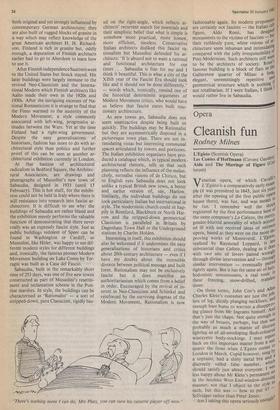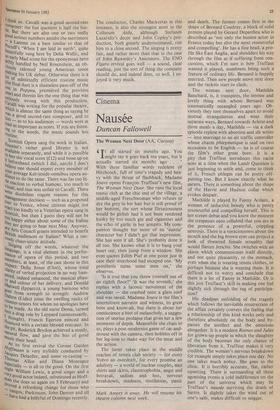Opera
Cleanish fun
Rodney Milnes
L'Egisto (Scottish Opera) Venetian opera, of which Cavallis V L'Egisto is a comparatively early anal; pie (it was premiered in 1643, just six year_ after the opening of the first public oPer' house there), was fun, and was meant tdic be fun. I remember well the sh°cf registered by the first performance her ° the same composer's La Calisto, the moll gender-blurred amorality of which accor ed ill with our received ideas of seicent° opera, based as they were on the more in' proving works of Monteverdi. L'Egisto' realised by Raymond Leppard, is less substantial than Calisto, dealing as it d°e, with two sets of lovers paired wrong`Yi through divine intervention and — through Pared similar intervention — eventually Pa11,, rightly again. But it has the same air of hedonistic sensuousness, a real tonic 1" these freezing, snow-drifted, trainles5 times. O those terms, John Cox's and Alle11. Charles Klein's costumes are just the i(w,; lots of leg, dizzily plunging necklines, an enough bare bums to warrant a disapPn' ing glance from Mr Ingrams himself. A% that's just the chaps. Not quite enough 1, the way of breasts, perhaps, but that was probably as much a matter of discreeA lighting as of all-enveloping flesh-coloure“, winceyette body-stockings. I may NW; back on this important matter from a sea' nearer the front when L'Egisto comes t, London in March. Cupid however, sung l'/ a soprano, had a shiny metal bra andd discreetly veiled false member, should satisfy just about everyone. I less happy about Mr Klein's permanent set in the luscious West-End-window-dressing manner; not that I object to the stYle s such, but this was — how to put it? Selfridges rather than Peter Jones.
Am I taking this opera seriously enough?
I think so. Cavalli was a good second-rate
mposer: the fun quotient is half the bat- tle. But there are also one or two really good serious numbers amidst the merriment
a Lament on a bass similar to that of beautifully 'When I am laid in earth', quite ueautifully sung here by Delia Wallis, and ,iallearlY Mad scene for the eponymous hero deftly handled by Neil Rosenshein, an ob- vt011slY talented young American tenor Inaking his UK debut. Otherwise there is a lOt of admittedly efficient routine music (tile final duet is a shameless pass-off of the tme in Pop,pea, premiered the previous Year) and therein lies the one thing that was seriously wrong with this production. c avalli was writing for the popular theatre, which is almost the same thing as saying he h‘vas a good second-rate composer, and to — as to his audiences — words were at !east as important as notes. If you are listen- ing to the words, the music sounds less routine.
Scottih Opera sang the work in Italian. austini'ss rather good libretto is not ,avallable separately, and while it is possible in buy the vocal score (E12) and bone up on b.eforehand (which I did, natch) I don't uelieve one should expect every member of Yd°ur average Kelvinside-omnibus opera au- Illence to do the same. There was far too lit- ye reaction to verbal humour, too much to 2snal, and that was unfair to Cavalli. There Zere doubtless cogent reasons for this tour decision — such as a proposed ,-111. to Venice, whose citizens might not react too kindly to a Venetian opera sung in S. cottish, but then I guess they will not be t.L.° ha y pp either about some of the Italian `11eY are going to hear next May. Anyway, Ye. Arts Council grants intended to benefit r rItish audiences or Italian? What a nar- °v1.1Y chauvinistic attitude. Singing off the words, whatever the ja„ guage, is a vital element in the perfor- mance of opera of this period, and two members, at least, of the cast shone in this, rlleisPect: Della Jones (Clori), whose total clarity of verbal projection in no way ham- pered, indeed enhanced, the musical p e vilau- and colour of her delivery, and Donald Maxwell (Ipparco), a young baritone who goes from strength to strength. Andrew _ Dalton (Lidio) joins the swelling ranks of counter-tenors for whom no apologies have Into made. As the old nurse Dema, turned r° a drag role by Leppard (unnecessarily, ft Thought), Francis Egerton minced and th °11nced with a certain blessed restraint. In
Pit, Roderick Brydon achieved a steady, natural flow, and gave the bits of good music their head.
At its first revival the Covent Garden ig/mann is very stylishly conducted by eJacques Delacote, and some re-casting — :I°Illas Allen and Diana Montague — is all to the good. On the first night William Lewis, a good singer and a very good actor indeed, substituted as Hoff- Irian (he does so again on 5 February) and Preyed a refreshing change for those who
tangos, Parkinson, John Denver and all have had a bellyful of Domingo recently.
The conductor, Charles Mackerras in this instance, is also the strongest asset in the Coliseum Aida, although Stefanos Lazaridis's decor and John Copley's pro- duction, both greatly underestimated, run him to a close second. The singing is pretty fair, and rather more than that in the case of John Rawnsley's Amonasro. The ENO Figaro revival goes well — a sound, clear reading, just the sort of thing the company should do, and indeed does, so well. I en- joyed it very much.



































 Previous page
Previous page